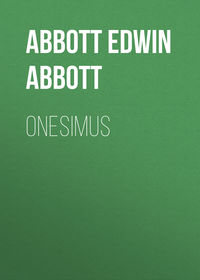Книгу нельзя скачать файлом, но можно читать в нашем приложении или онлайн на сайте.
Читать книгу: «Onesimus», страница 21
NOTES
Many of the dialogues and some of the descriptions in the preceding pages, are borrowed from ancient authors; who however wrote in most cases after the times of Onesimus. For example, whereas Onesimus lived at Colossæ about 60 A. D.; Epictetus probably flourished a generation later; Maximus of Tyre, the defender of Polytheism from the social side, who is represented above by the fictitious Nicostratus, wrote under the Antonines; Ælius Aristides, the eulogist of Asclepius, who is represented above by Oneirocritus, was born about 117 A. D.; Apuleius from whom is borrowed (pp. 17, 18) the description of the ergastulum, and also (p. 181) the description of the dancers of Cybele, wrote in the second century after Christ; Celsus, the sceptic, who is represented (pp. 123-8) by the sceptical Artemidorus, wrote at the beginning of the second century; and lastly Justin Martyr and Irenæus, from whom are mainly borrowed the discourse of Lucius of Cyrene, wrote severally about 150 A. D. and 170 A. D.
“A confession of anachronism then?” Yes: anachronism. But if only such sayings have been selected from these authors as express thoughts that were, at least in their germs, contemporaneous with Onesimus, then the life of St. Paul’s convert is really better illustrated by this systematic anachronism than by the most felicitously invented dialogue of modern scholars. Artemidorus, Nicostratus, Philemon and Oneirocritus represent thoughts that must have been in the air throughout Asia as early as 60 A. D., though they did not find expression in extant books till some time later. So also of Justin and Irenæus; it may safely be asserted that the tendency to see in each of the acts of Jesus the exact fulfilment of some prophecy, and in each prophecy the prediction of some act of Jesus—the next step being to believe, and then to assert, that that act must consequently have occurred—permeated the early Christian church at least as early as the date of the composition of the Introduction to St. Matthew’s Gospel, and long before it found expression in the pages of Justin and Irenæus.
In the following notes on special passages, it has not been thought necessary to give a separate reference for every quotation, but only in those cases where the words of some ancient author seemed in danger of being supposed to be modern.
Покупайте книги и получайте бонусы в Литрес, Читай-городе и Буквоеде.
Участвовать в бонусной программе
